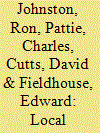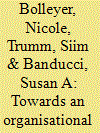| Srl | Item |
| 1 |
ID:
112079


|
|
|
|
|
| Publication |
2012.
|
| Summary/Abstract |
Despite attempts over the last decade to bring an end to what has become an 'arms race' between political parties, party funding in the UK continues to defy resolution. Drawing on the experience of the committee charged by the last Labour administration to put party funding and electoral spending on a more sustainable footing, this article examines the issues and the main sticking points. It outlines the basis on which the negotiations were undertaken, and the main hurdles they sought to overcome. It highlights the disagreement between the parties on the definition of the central issue, the problems associated with the main funding sources for each of the parties, and the viability of state funding. It discusses why success proved elusive, but also why a solution is necessary, since in the absence of robust rules, parties and therefore the UK political system more broadly, are 'a hostage to the next scandal'.
|
|
|
|
|
|
|
|
|
|
|
|
|
|
|
|
| 2 |
ID:
105864


|
|
|
|
|
| Publication |
2011.
|
| Summary/Abstract |
The regulation of party political funding and expenditure in the United Kingdom is an issue of continuing political and public debate. Campaign expenditure by candidates has been regulated since the late nineteenth century, but this has applied only during the short campaign period between the dissolution of Parliament and polling day. Concerns have been raised about earlier expenditure levels, but these were not regulated until legislation in 2009 which limits the amount that candidates can spend in the months prior to Parliament's dissolution-in 2010 this covered the period between 1 January and 15 April: the election was held on 6 May. The Electoral Commission has released information on all candidates who made a return of their expenditure during both periods. This article provides descriptive data on those amounts, by party and type of constituency, plus analyses which show that the more that a party spent the better its performance at the polls.
|
|
|
|
|
|
|
|
|
|
|
|
|
|
|
|
| 3 |
ID:
120139


|
|
|
|
|
| Publication |
2013.
|
| Summary/Abstract |
Which parties represented in the European Parliament (EP) are able to extract regular donations from their MEPs' salaries and, if they extract donations, how great are they? In the literature on party finances, there has been a lack of attention paid to the use of salaries of elected representatives as a source of funding. This is surprising given that the national headquarters of many parties in Europe regularly collect 'party taxes': a fixed (and often significant) share of their elected representatives' salaries. In filling this gap, this article theoretically specifies two sets of party characteristics that account for the presence of a taxing rule and the level of the tax, respectively. The presence of a tax depends on the basic 'acceptability' of such an internal obligation that rests on a mutually beneficial financial exchange between parties' campaign finance contributions to their MEPs and MEPs' salary donations to their parties. The level of the tax, in contrast, depends on the level of intra-organisational compliance costs and parties' capacity to cope with these costs. Three factors are relevant to this second stage: MEPs' ideological position, the size of the parliamentary group and party control over candidate nomination. The framework is tested through a selection model applied to a unique dataset covering the taxing practices in parties across the European Union Member States.
|
|
|
|
|
|
|
|
|
|
|
|
|
|
|
|